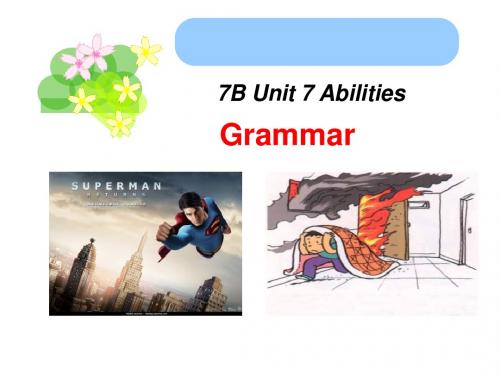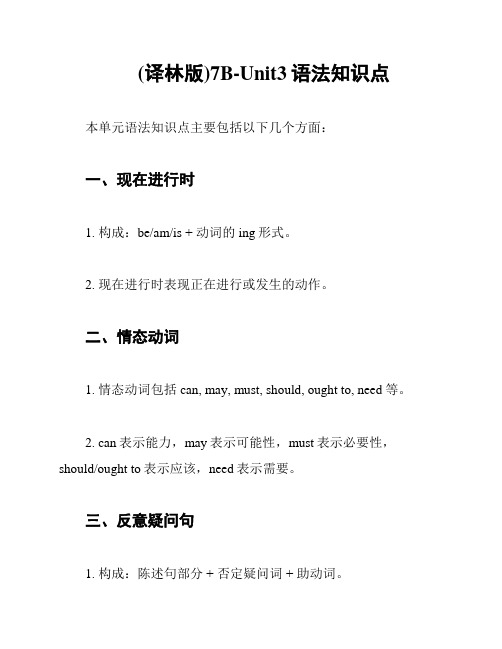2017 牛津译林英语 7B 语法专题七 情态动词和感叹句
译林版7Bunit7知识点讲解+练习

Unit 7 abilities一、重要句型1.believe it or not . 信不信由你believe sb 相信某人believe in sb =trust sb 信任某人2.look out =Be careful 当心look out for sth =be careful with sth 当心某物3.I can fly =I am able to fly =I have the ability to fly. 我能飞.(指某一种能力)sb can do sth =sb be able to do sth =sb has/have the ability to do sth 某人有能力做某事。
4.give a seat to someone on the bus 在公交车上给人让座。
collect things for Project Hope。
为希望工程收集东西。
give a seat to sb =give sb a seat 给某人让座。
collect sth for……为……收集某物5.How cool!多么酷!what a brave young man!多么勇敢的年轻人!How brave you are!你是多么勇敢啊!感叹句句式是由how 和what构成。
how +adj/adv+主语+谓语动词!what a/an+(adj)+可单+主语+谓语动词!what +(adj)+可数/不可数+主语+谓语动词!判断感叹句用how和what的步骤:1.先找出句子中的主语+谓语动词(括号起来不看)2.看剩下的部分是否有名词,有的话用what,无的话用how。
6.put out the fire 扑灭火put off 推迟put up 举起,张贴搭建put in 安装put on 穿上7. I didn’t have time to think about it。
我没有时间去考虑它。
(译林版)7B-Unit7语法知识点

(译林版)7B-Unit7语法知识点(译林版)7B-Unit7 语法知识点本文档将介绍(译林版)7B-Unit7中的语法知识点。
1. 形容词和副词的比较级和最高级形容词和副词的比较级和最高级用于对两个或多个人或事物进行比较,并表达大小、高低、快慢等概念。
比较级的构成方法:1. 一般在形容词或副词后面加上-er,如taller,faster。
2. 以字母e结尾的形容词或副词,直接加-r,如nicer,larger。
3. 以辅音字母+y结尾的形容词或副词,将y变为i,再加-er,如busier。
4. 多音节和部分双音节形容词或副词在前面加more,如more interesting,more quickly。
最高级的构成方法:1. 一般在形容词或副词前面加上the,再在后面加上-est,如the tallest,the fastest。
2. 以字母e结尾的形容词或副词,直接加-st,如the nicest,the largest。
3. 以辅音字母+y结尾的形容词或副词,将y变为i,再加-est,如the busiest。
4. 多音节和部分双音节形容词或副词在前面加the most,如the most interesting,the most quickly。
2. 一般过去时一般过去时用于表示过去发生的动作或存在的状态。
构成方法:1. 对于大多数动词,在动词原形后面加上-ed,如worked,played。
2. 以e结尾的动词,直接加-d,如lived。
3. 以辅音字母+y结尾的动词,将y变为i,再加-ed,如studied。
特殊情况:1. 以辅音字母+y结尾的动词,如果在末尾前有一个元音字母,则直接加-ed,如stayed。
2. 以辅音字母+ie结尾的动词,将ie变为y,再加-ed,如cried。
3. 一般将来时一般将来时用于表示将来发生的动作或存在的状态。
构成方法:1. 对于大多数动词,在动词原形前面加上will,如will work,will play。
新译林牛津 7B Unit7知识点梳理以及考点(结合四套名校真题)

7B Unit 7 AbilitiesⅠ概况1.考察over的用法,介词,有完全或部分覆盖之意2.考察固定搭配try one's best尽某人的全力3.考察固定搭配lose one’s way迷路,并注意其过去式。
4.Take,cost的用法比较;pay for和spend on的搭配。
前面两个物做主语,后面两个人做主语。
sb. pay (sb.) for sth.sb. spend +时间/金钱(in)doing sth.on sth.It takes sb. some time to do sth.sth. cost sb.+ 金钱5.take part in 表示参加...活动,而join一般表示加入组织、团体、个人。
6.对于can, could的考察,主要考察对于其表示请求时的回答,考察其表示能力的题目较少。
肯定回答一般是:Y es,I can或者是No problem 否定回答是You’d better not.或者是I’m afraid you can’t7.对于感叹句的考察,主要考察对于what的使用,且易与不可数名词fun,news,weather,fun一起考察。
故要牢记这些词不加冠词a。
Ⅱ详细讲解一、重点词组二、重要句型1、Believe it or not! 信不信由你!belive/think后可接that引导的宾语从句,当主语为第一人称,后接否定意义的宾语从句时,需要否定前移。
eg. 我认为他不会通过考试。
正:I don’t think/believe that he can pass the exam.误:I think/believe that he can’t pass the exam.2、We can send some books to them. 我们可以给他们送些书。
(过去式sent)send用作及物动词,意为“寄(信等);发(电报);(派人)送”。
牛津译林英语7B Unit 7 Abilities

Using „can‟, „could‟, „may‟ and to talk about permission(许可)
1. can 与 could can 常用于口语中,表示非正式的请求, 请求对象一般是家人或朋友。e.g. — Can I borrow your bike, Simon? 西蒙, 我可以借一下你的自行车吗? — Of course. 当然可以。
ride a bike
last year now
play tennis
in 1990 now
swim
at 6
now
fly a kite/ kites at that time now
skate
when she was young now
Ask 我们来总结一下:
情态动词can/could用法: 肯定句: 主 + can/could + 动词原形 … 否定句: 主 + can‟t/couldn‟t + 动词原形 … 一般疑问句: Can /Could+ 主 + 动词原形 …? 肯定回答: Yes, 主 + can/could. 否定回答: No, 主 + can‟t/couldn‟t. 特殊疑问句: eg. What can/could I do for you?
在口语中,could常用来代替can向对方 更委婉、有礼貌地提出请求,用法上比 can正式,可以用于向老师或长辈提出 请求,这时could不表示过去,但是否 定回答只能用can‟t,不能用couldn‟t。
e.g. — Could I use your computer, please? 请问,我可以用一下你的电脑吗? — Yes, you can/could. 可以。 — Could I hand in our homework later, Mr Lin? 林老师,我可以稍后交作业吗? — No, you can‟t. 不,不行。
(译林版)7B-Unit3语法知识点

(译林版)7B-Unit3语法知识点
本单元语法知识点主要包括以下几个方面:
一、现在进行时
1. 构成:be/am/is + 动词的ing形式。
2. 现在进行时表现正在进行或发生的动作。
二、情态动词
1. 情态动词包括 can, may, must, should, ought to, need等。
2. can表示能力,may表示可能性,must表示必要性,should/ought to表示应该,need表示需要。
三、反意疑问句
1. 构成:陈述句部分 + 否定疑问词 + 助动词。
2. 如果陈述句为肯定句,则反意疑问句为否定形式;如果陈述句为否定句,则反意疑问句为肯定形式。
3. 当陈述句中含有情态动词时,反意疑问句中的助动词要和情态动词保持一致。
四、一般现在时和现在进行时的区别
1. 一般现在时表示经常或惯性发生的动作或状态。
2. 现在进行时表示正在进行或发生的动作。
五、动词不定式
1. 构成:to + 动词原形。
2. 动词不定式可以作主语、宾语、表语、定语、状语等。
以上是本单元的语法知识点总结,希望同学们认真学习,多做练习,提高英语语言运用能力。
牛津译林7BUnit7 单元语法专练练习课件

句型
例句
How+形容词( +主语+谓 How kind ( the girl is )!( 这
语 )!
个女孩 )多么善良啊!
How well ( she
How+副词( +主语+谓语 )! dances )!( 她舞蹈跳得 )多
好啊!
How+主语+谓语!( 此句型 中how修饰动词,但动词不 提前。 )
感叹句 1.定义 感叹句是用来表达喜怒哀乐等强烈感情的句子。感叹句一般由what或how引导,句末 加感叹号。
2.感叹句的构成 ( 1 )what引导的感叹句句型。
句型
例句
What+a/an+形容词+可数名 词单数( +主语+谓语 )!
What an interesting story ( it is )!( 它是 )多么有趣的一 个故事啊!
Ⅱ.单项填空
( B )1.—
I take the seat?
—Sorry,
.It’s for my son.
A.Can;you canB.Could;you can’t
C.May;you couldn’t D.May;you needn’t
( A )2.The girl
swim when she was only four years old.Isn’t it amazing?
What sweet flowers they are! 4.( 南通中考 )The girl gave a rather wonderful speech last Friday.( 改为感叹句 )
What a wonderful speech the girl gave last Friday!
牛津译林英语7B Unit7 Abilities 知识点
牛津译林英语7B Unit7知识点一、重要语言点1. Look out, Eddie ! 当心,埃迪!(1)look out 意为“小心”,相当于be careful. 单独使用时,后面不接宾语。
如:Look out! A car is coming. 小心!汽车来了。
(2)look out 后接其他介词时,要带宾语。
比如:look out at... 向外看...We look out at the beach. 我们朝沙滩看。
look out of 朝...外看Eg. Don’t look out of the door. 不要朝门外看。
2. Believe it or not! 信不信由你!(1)believe动词,意为“相信;认为”。
Eg. I believe her (to be) right. 我认为她是对的。
(2)believe in 意为“相信;信任;信奉”。
Eg. Those people believe in God. 那些人信奉上帝。
3.We can send some books to them. 我们可以给他们送些书。
(1)send用作及物动词,意为“寄(信等);发(电报),派(人送)”。
Eg. I will send you a postcard while I’m away on holiday.我去度假期间将寄给你一张明信片。
(2) send 的其他词组send up 发射send for (派人去)请来send out 散发(气味,光)等send sb off 送别= see sb off4. Some children are not even able to pay for school.一些孩子甚至不能付上学的钱。
(1) even 副词,意为“甚至;更;还”。
Eg. The next morning Jenny got up even earlier. 第二天早上詹妮起得更早(2) even 其他用法even if/ even though 即使Eg. We’ll go to the Great Wall even if it rains. 即使下雨,我们也要去长城。
新版牛津7B unit 7 Grammar---情态动词
新版7B Unit7 AbilitiesGrammar---情态动词一.can, could和maycan/could的基本用法1.表示能力,意为“能,会”。
表示现在的能力用can,表示过去的能力用could。
此时可以用短语be able to与之替换。
如:She can speak French very well. 她说法语说得很好。
=She is able to speak French.I could catch the bus, but I didn’t want to. 我当时能赶上车的,但是我没想赶。
2.表示许可,意为“可以”。
表示请求别人允许自己做某事时,两者都可用,但could表示一种委婉语气。
表示允许别人做某事时,一般只用can,不用could。
如:Can I borrow your book?我能借你的书吗?Could you help me? 你能帮助我吗?3.can/could表示怀疑、猜测时,意为“可能”。
can’t/couldn’t意为“不可能”。
如:He can’t/couldn’t be only fifty.他不可能只有五十岁。
This can’t be finished by her.这不可能是她完成的。
4.以can开头的一般疑问句,其肯定回答和否定回答分别用can和can’t;以could开头的一般疑问句,其肯定和否定回答分别用could和couldn’t。
但表示允许别人做某事时,其回答用can,而不用could。
如:----Could I use your pen? ----我可以用你的钢笔吗?----Yes, of course you can. ----当然可以。
5.may的基本用法表示请求或许可,意为“可以”,一般可以与can互换使用。
may表示请求时,其否定回答用mustn’t,意为“不可以,不许,禁止”,不用may not。
如:----May I come in? -----我可以进来吗?----Yes, you may. / No, you mustn’t. ----可以的。
新版译林7Bunit7知识点整理
Unit 7 Abilities一、重点词汇ability n. 能力believe vi. 相信seat n. 座位send vt. 送;邮寄;派遣notebook n. 笔记本even adv. 甚至able adj. 能,能够pay vt. 付钱;给...报酬raise vt. 筹集brave adj. 勇敢的save vt. 救,救助smoke n. 烟,烟雾vt.吸烟badly adv. 严重地,厉害地hurt vi.&vt. 使受伤,伤害;疼adj.受伤的could modal v. (can 的过去式) 可以,能,会pour vt. 倾倒project vt. 保护rush vi. 冲,奔wet adj. 湿的blanket n. 毯子burn vt.&n. 烧伤,燃烧moment n. 片刻;瞬间nod vt.&vi. 点头careful adj. 仔细的,认真的,小心的reporter n. 记者news n. 新闻,消息newspaper n. 报纸match n. 火柴rubbish n. 垃圾,废弃物bin n. 垃圾箱recommend vt. 推荐madam n. 女士,夫人till prep.&conj. 到...时,直到...为止camera n. 照相机X-ray n. X光,X射线term n. 学期article n. 文章careless adj. 粗心的piano n. 钢琴violin n. 小提琴sir n. 先生award n. 奖;奖品;奖金vt. 授予,奖励part n. 部分lose vt. 迷失;丢失;失去look out 留神;当心plant trees 植树help an old man 帮助老人clean up 收拾干净give a seat to someone 将座位让给某人collect things for 为...收集东西Project Hope 希望工程an old people’s home 养老院in poor areas 在贫困地区send some books to sb 送书给...pay for 为...付款different abilities 不同的能力be able to 能,会raise some money for 为...捐款give awards to 给...颁奖recommend someone for an award 推荐某人获奖recommendation letter 推荐信the Helping Hands Club 帮手俱乐部brave enough 足够勇敢save...from 从...中救出hear someone doing 听到某人正在做... run outside 跑出去a lot of smoke 大量的烟next door 在隔壁the 79-year-old Mrs Sun 79岁的孙奶奶be badly hurt 伤得很重pour water over 把水倒在...上面rush into 冲进去heavy smoke 浓烟put out the fire 灭火a wet blanket 一条湿毯子be in hospital 住院give sb flowers and presents 给某人花和礼物at that moment 在那时think about 考虑,思考be careful with 小心... call for help 呼喊求教sound dangerous 听起来危险play with 玩ride a horse 骑马 a good place to have fun 娱乐的好地方make a call 打电话leave...at home 将...忘在家中no problem 没问题by the way 顺便问一下,顺便说说need to read more and speak more 需要多读多说work hard on 在...努力be careless 粗心do/try one’s best 尽某人最大努力do well in 在...做得好at the age of 在...岁时show sb how to do sth 指点某人如何做某事English-Chinese Dictionary 英汉字典recommend sb for 推荐某人做...Young Star Award 青年明星奖think carefully 仔细考虑plan everything well 一切计划得好take part in 参加in need 需要 a five-year-old boy 一个五岁的男孩lose one’s way 迷路look forward to 盼望hear from 收到...的来信二、重点句型1. Look out, Eddie ! 当心,埃迪!(1)look out 意为“小心”,相当于be careful. 单独使用时,后面不接宾语。
牛津7B语法复习
7B语法复习(unit4—unit6)1. 感叹句(Expressions with “What” and “How”)★用以表示喜怒哀乐等强烈感情的句子叫做感叹句。
感叹句的句末常用感叹号,也可以用句号,一般读作降调。
感叹句通常由感叹词what或how构成。
简单地将what 或how以及它所修饰的词置于句首,即可构成感叹句。
例如:①How green the grass is! 草多么青啊!②How clever the boy is! 那男孩多聪明啊!③Look! How fast he is running! 看!他跑得多快啊!④What a beautiful room it is. 这是一个多漂亮的房间啊!⑤What beautiful flowers they are. 多么漂亮的花儿啊!⑥What fine weather! 这天气多好啊!★从以上的例句,不难总结出how后接形容词或副词,what后接名词。
如下表所示:a/an+形容词+单数可数名词What+形容词+复数可数名词(+主语+谓语)!感叹句形容词+不可数名词形容词How+(+主语+谓语)!副词因此,在实际的运用过程中,我们应注意区分强调的是形容词、副词、还是名词。
强调形容词、副词时用how,强调名词时用what。
如:①What a fine building that is! 那是一幢多么漂亮的建筑物啊!②What a cute baby! 多可爱的小宝宝啊!③How wonderful the film is! 这部电影多棒啊!④How nice! 真不错!2. 物主代词★物主代词是表示所有关系的代词,即人称代词的属格,表示“所有”。
它可分为两类,即:形容词性物主代词和名词性物主代词。
它和人称代词一样也可分为第一人称,★形容词性物主代词相当于形容词,可放在名词前修饰名词。
如:①David is playing with his dog. 戴维正和他的狗玩。
- 1、下载文档前请自行甄别文档内容的完整性,平台不提供额外的编辑、内容补充、找答案等附加服务。
- 2、"仅部分预览"的文档,不可在线预览部分如存在完整性等问题,可反馈申请退款(可完整预览的文档不适用该条件!)。
- 3、如文档侵犯您的权益,请联系客服反馈,我们会尽快为您处理(人工客服工作时间:9:00-18:30)。
Unit 7 Abilities 语法专题七情态动词和感叹句一核心语法内容梳理1 情态动词can, could的用法1)can 的用法Can表示某人具有某种能力,意思为“能,会”,也表示客观的可能性,是“能够,可能”的意思,后接动词原形,适用于所有人称。
2)could为can的过去式,表示“能,可以”,另外could可用来代替can,表示更为客气委婉的语气,用来提出要求。
2 感叹句的用法感叹句用来表示强烈的感情,能表达喜悦、愤怒、悲哀、惊奇、厌恶和赞赏等。
在口语中常用省略句,后面的主语和谓语往往省略,有时只用一个词或词组表达。
1)以what开头的感叹句,what作定语,修饰名词(名词前也可以有其他定语),可数名词单数形式前要加不定冠词a/an.What a clever boy (he is)! 多么聪明的孩子!2)以how开头的感叹句,how作状语,修饰形容词,副词或动词。
如:How blue the sky is! 天空多么蓝啊!3)疑问句形式的感叹句:有些感叹句采用一般疑问句形式表示,以否定词开头,在口语中读降调。
如:Isn’t it a lovely view? 多美的景色啊!二、巩固练习1 根据句子意思,选用can, could, can’t, couldn’t, may 填空。
1 Last year I ________ row a boat, and now I________, either.2 Simon ________swim when he was only seven years old.3 Lucy________ ride a bike half a year ago, but now she________ do it very well.4 It ________be right. But I am not sure.5 --Could I use your dictionary, please.--Of course you________.6 --________I smoke here?--No, you can’t.7--Who________ it be?--I think it might be Bob.8 The water in the river is polluted. Tom ________catch any fish in it.9 --Whose car is this?--I don’t know. Ask Daniel. He________ know.10 My little brother ________be a good student because he is very lazy.Keys: 1-5 couldn’t, can’t; could; could, can; may; can 6-10 Can/May; might; can’t; may; can’t2 用what, what a, what an, 或how填空1 __________ beautiful the Tianmu Lake is!2 __________ wonderful the basketball match is!3 __________ interesting class it is!4 __________ good weather!5__________ lovely that little girl is!6 __________ delicious the soup is!7 __________ time flies!8 __________ strange sound!Keys: 1-5 How; How; What an; What; How; 6-8 How; How; What a;3 单选选择1 Here is my phone number. You _____call me any time you like.A mustB canC shouldD need2 --Why did you pull the girl?--You see, traffic was so busy that anything _____happen to her at that moment.A couldB shouldC mayD must3 --_____brave Zhang Hua is!--Yes. He helped his neighbour, Mrs Sun, out of the fire.A What aB HowC How aD What4 Andy makes few spelling mistakes. _____careful boy he is!A WhatB What anC What aD How5 --Could I have a look at the photo of your family, Sam?--Of course, you______.A mayB canC couldD might6 --That black T-shirt with Yao Ming’s picture on it _____belong to David. He admires him a lot. --No, it _____ be his. He hates black.A can; can’tB may; needn’tC must; mustn’tD must; can’t7--____ I know by what time you want the project to be done?--By the day after tomorrow. ____ you finish it on time?A May; CanB Must; NeedC Could; MustD Need; Would8 --Bob, Where is Linda?--She ______ be in the library. But I am not sure.A mustB mayC needD has to9 ____ role she played in the movie! That’s why she has a lot of fans.A How interestingB How an interestingC What interestingD What an interesting10 ___ sunshine! Shall we take a walk in the garden?A What a beautifulB What beautifulC How a beautifulD How beautiful11 The little girl is playing ______ piano so well.A aB anC theD /12 ______ big fish they are!A WhatB howC What aD How a13 She said she ______ dance quite will when she was five.A mightB couldC mustD can14 --Mr Smith must have been to your home this morning.--No, he _____, because he didn’t know my address.A couldn’tB can’tC mustn’tD may not15 _____ music she is playing!A What niceB What a niceC How niceD How16 --Dick, ____ I use your e-dictionary?--Yes, please. _____ you give it to Mike after you use it?A will; WouldB may; MightC can; CouldD shall; Should17 --Please be quiet. Our teacher is coming.--It _____ be our teacher. She has gone to Beijing.A mustB mayC can’tD mustn’t18 --The world top player South Korean Lee lost the game against the computer programme Alphago.--____ surprising news.A What aB WhatC HowD How a19 --____ your brother speak Japanese、--Yes, he has learnt it in Tokyo for three years.A ShouldB MustC CanD May20 I’m good at playing ____ piano and I can also play ____ volleyball well.A the; /B the; theC /; theD /; /Keys: 1-5 ACBCB 6-10 DABDB 11-15 CABBA 16-20 CCBCA。
